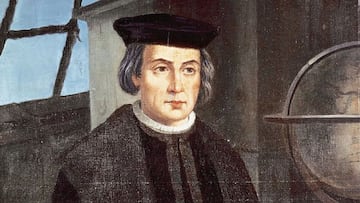Christopher Columbus: Hero, villain or something in between? The explorer’s legacy is still sparking debate
For centuries the legendary explorer was celebrated as a hero but newer perspectives have questioned the consequences of his actions.


On October 12, 1492 Christopher Columbus made landfall in the Americas. The Italian navigator was the first European to open up the trans-Atlantic naval route, sparking an era of widespread exploration and colonization.
Columbus was commissioned by the Catholic Monarchs of Spain to search for the ‘New World’ and the Spanish quickly made significant in-roads into the continent, ending what is now known as the ‘pre-Columbian’ era.
For centuries Columbus was celebrated as a hero, and October 12 venerated as a day to celebrate his greatest triumph. He bravely set out to discover new lands and he became a symbol of perseverance and achievement.
But in recent decades there has been significant revision of that view, with many historians pointing to the effects that Columbus’ voyage had on the native peoples of the Americas. His arrived ushered in systems of colonization, forced labor and violence, and some records describe his own poor treatment of the people that he encountered.
How did Christopher Columbus reach the Americas?
In 1492 Christopher Columbus set sail from Spain with three ships, the Niña, the Pinta and the Santa María, seeking a faster route to Asia. Instead he reached islands in the Caribbean and inadvertently ‘discovered’ the Americas. Earlier Norse explorers like Leif Erikson had visited parts of North America centuries but Columbus’ voyage marked the beginning of continuous contact between Europe and the continent.
Columbus believed he had reached islands near Asia, but his journeys ultimately opened the door to European exploration and colonization of the New World. His arrival transformed history, reshaping global trade, culture and migration. For Spain, his success brought immense wealth and influence, fueling its rise as a world power.
In the United States Columbus became a symbol of exploration and determination. However his legacy is debated. Many honor his courage and skill as a navigator, while others point to the devastating impact European colonization had on Indigenous peoples. Regardless of perspective, Columbus’ 1492 voyage remains one of the most pivotal events in world history, marking the start of a new global era.
Related stories
Get your game on! Whether you’re into NFL touchdowns, NBA buzzer-beaters, world-class soccer goals, or MLB home runs, our app has it all.
Dive into live coverage, expert insights, breaking news, exclusive videos, and more – plus, stay updated on the latest in current affairs and entertainment. Download now for all-access coverage, right at your fingertips – anytime, anywhere.


Complete your personal details to comment